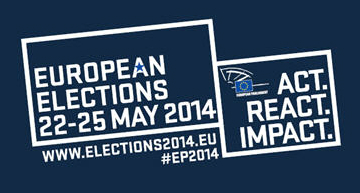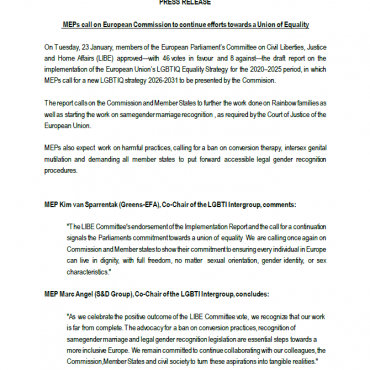#EP2014: Why does this election matter for LGBTI rights?
Starting today, the 8th direct election to the European Parliament will determine the EU’s action over the next five years, including in the field of fundamental rights for LGBTI people.
 In the period 2014-2019, the European Parliament will play a central role in shaping EU policy against discrimination; on hate speech and hate crime; on free movement; on the rights of transgender individuals; health; and LGBTI issues in the EU’s foreign policy.
In the period 2014-2019, the European Parliament will play a central role in shaping EU policy against discrimination; on hate speech and hate crime; on free movement; on the rights of transgender individuals; health; and LGBTI issues in the EU’s foreign policy.
Find out why this election matters for the fundamental rights of LGBTI people.
1. Decisive EU action against discrimination
The next Parliament should urge the Commission to put forward an LGBT roadmap, and press the Council to finally adopt the anti-discrimination directive.
[wpex more=”Read more…” less=”Close”]The EU has comprehensive equality policies on disability, gender equality, and Roma integration, but none for sexual orientation or gender identity. Furthermore, EU law outlaws discrimination on sexual orientation in employment—yet in education, social protection, healthcare, and access to goods and services this is still not the case.[/wpex]
2. Common EU rules against hate speech and crime
The EU should combat hate speech and crime based on sexual orientation or gender identity more than it currently does.
[wpex more=”Read more…” less=”Close”]As many as one in four (26%) LGBT people in Europe were attacked or threatened due to their sexual orientation or gender identity. While EU law foresees higher penalties for racist and xenophobic speech and crime since 2008, it sets no standards for homophobic or transphobic speech and crime.[/wpex]
3. Free movement for LGBTI individuals and their families
It is time for the EU to enable the mutual recognition of the effects of civil status documents in the EU.
[wpex more=”Read more…” less=”Close”]Marriages and partnerships legal in one Member State cease to exist when crossing borders, despite the principle that Member States must recognise one another’s judiciary decisions. This causes severe trouble for families (including children) and individuals who can’t travel, live or work in another EU country, simply because of who they love.[/wpex]
4. Secure transgender rights
Transgender people still face a number of problems in their daily lives, to do with health, access to employment, or in their dealings with justice systems.
[wpex more=”Read more…” less=”Close”]EU institutions should now ensure the broad inclusion of gender identity in European laws and policies. Furthermore, the EU should continue working with the World Health Organization to stop considering transgender individuals mentally ill.[/wpex]
5. Tackle discrimination in access to health
Accessing healthcare has become increasingly difficult for certain groups, including LGBTI people. The EU should increase its actions in this important field.
[wpex more=”Read more…” less=”Close”]Often LGBTI individuals face obstacles when accessing health services, including public healthcare. This is notably the case for transgender individuals; sex workers; men who have sex with men; and LGBTI people from vulnerable groups, such as younger people or from a migrant background. EU action in the field of health should seek to reduce discrimination, in partnership with practitioners and NGOs.[/wpex]
6. Promote the rights of LGBTI people abroad
The EU must continue promoting the full enjoyment of all human rights for LGBTI people in the world, as it has done over the last years.
[wpex more=”Read more…” less=”Close”]In June 2013, the Council adopted landmark guidelines on LGBTI rights in the world. EU external policy should include LGBTI rights prominently in all bilateral relationships; enlargement and neighbourhood policies; at international organisations; and as part of funding support for human rights defenders.[/wpex]
Read more:






